- Home
- Helen Humphreys
Helen Humphreys Three-Book Bundle Page 29
Helen Humphreys Three-Book Bundle Read online
Page 29
Maeve has never questioned her life. Things happened or didn’t happen. She didn’t care about the reasons. But now, standing here, she wishes she’d known Jeremy’s father, that she’d married him, that they’d made a home together. Yet she knows that that wouldn’t have necessarily kept Jeremy safe. Having another person to love, having a family, would just mean that she would have more to lose on this terrible night. “I want to go home now,” Harriet says to Jeremy. “I don’t have much, but I want to see if it’s still there. I want to make sure Wendell Mumby is safe. Besides, I don’t want to die in an Anderson shelter.”
Jeremy has finished wrapping her arm in the piece of chintz, tied a neat knot just below her elbow to hold the fab ric in place. “I’ll come with you,” he says. He seems more fond of her since she returned from her quest for tea.
When they tell Marjorie Hatton that they must be off, she thanks them and shakes their hands solemnly, as she did when she first met them. The gesture seems both formal and intimate, as is everything to do with the war, everything that is happening to Harriet on this night.
“It’s not going to stop,” says Jeremy when they step out the shelter door and see the surge of fire on the horizon. “It’s not going to stop until there’s nothing left.”
They head back down the passage to High Street.
“Let’s go through the park,” says Harriet. “It’s quicker.” She leads the way. The streets are more deserted now. Harriet is amazed at how quickly she has become used to seeing dead bodies. We must be in shock, she thinks. All of us, all of Coventry. We must all be in shock.
There is an explosion near enough to them so that the wall of heat from the blast slams against them and knocks them flat. They lie there, Jeremy half on top of Harriet, protecting her with his body.
Harriet’s ears ring from the blast. She’s lying face down in the road. She can taste the damp stone, and her eyes water from the grit and dust.
Jeremy is lying with his chest across her back, and even though she is afraid, his weight is comforting. When the air has settled and he scrambles up, Harriet misses the feeling of his body lying across hers.
The water mains have been hit. The electrical supply is knocked out. The phone lines are down. The buildings that haven’t collapsed have their windows gone. Blackout curtains hang in rags from the window frames. The buildings that have suffered direct hits release debris into the air—bricks and bits of wood, slate tiles, a glittering crescendo of window glass. Harriet and Jeremy run through the streets with their arms covering their heads to ward off the wreckage.
In the park there are incendiaries standing upright in the grass, like candles. There are a couple of fire-watchers in helmets trying to put them out, kicking them over and stamping on them. By the time Jeremy and Harriet stumble over to help, the incendiaries have been extinguished. It is still impossible to talk without shouting. It is easier not to talk, and they weave across the grass in silence.
The leaves have burned black on the trees. The limbs are twisted and full of clothes, caught there like strange birds in the upper branches. The clothes must have blown up there from a bomb blast.
Harriet remembers the morning of November 14. How beautiful it was, all sun, and only a little wind to remind her of autumn. It was early closing. It was a Thursday. She had gone round to the shops before lunch, and she had felt lucky because she was first in line at the butcher and got sausages.
Maeve walks through her darkened house. She drags her fingers along the walls, feeling the nicks and bumps in the wallpaper that she didn’t know were there. The house isn’t familiar enough to her yet to allow her to walk around freely with the lights off. She needs to touch the walls for guidance.
The texture of the wallpaper feels like the sand on the beach where Maeve remembers having a picnic once, between the wars. She was with a man she barely knew, and she was waiting for him to kiss her while Jeremy raced behind them, in and out of the surf. She had been dragging her hand back and forth through the sand beside her while she waited for this man, whose name she has forgotten, to get up enough courage to lean across the picnic blanket toward her.
Maeve stops by the kitchen door. The house shakes from a nearby blast and she puts both hands out to steady herself against the door frame.
It was a perfect day, she thinks, that day at the seaside. There was sun and good food, the tension of waiting to be kissed, the happiness of watching Jeremy running through the waves. What she had felt was not the usual hurry to be on to the next moment but a desire to linger where she was.
Maeve wouldn’t have minded dying then, when she was happy like that—except for Jeremy. But not now, she thinks, pushing off from the kitchen doorway and drifting back into the hallway. Please, not now.
Harriet and Jeremy are nearing the end of the park. They have come more than half a mile perhaps and are nearly home. Remarkably few trees are down or on fire. It seems, except for the heavy thud of the bombs falling around them and the smoky light rising over the city, almost normal.
“What’s that?” shouts Jeremy, pointing to a misty shape by a thicket of bushes.
At first Harriet thinks it’s a trick of the light, but the shape moves its head and she can see that it is a horse. A white horse, head down, feeding on the grass. Maybe it is one of the horses that passed us in the street, she thinks. They instinctively move toward it, walking slowly over the grass to where it stands, oblivious.
“Look there,” says Jeremy in Harriet’s ear. “To the right of the horse, by that tree. Isn’t that a person?”
A woman sits up against the tree, her head slouched for ward against her chest. She has long blonde hair, with patches of dark that Harriet can see, once they get closer, are blood. She wears clothes that suggest she was on her way home from the office—a skirt and blouse. A cardigan lies beside her on the grass, and her shoes are gone. One of her legs is bent unnaturally back.
“It’s broken,” says Jeremy as they get closer.
The horse, now sensing them, throws its head back and whinnies. The woman jerks upright at the sound. Harriet and Jeremy kneel down on either side of her.
“I think I’m seeing things,” whispers the woman. “I think there’s something wrong with my eyes.”
They crouch down beside her. Now that they’re close to her, Harriet can see how matted with blood the woman’s hair is.
“It’s a horse,” says Jeremy. “You’re not seeing things.”
“How did you get here?” asks Harriet.
“Dragged myself,” says the woman. She shakes her head and blood splatters across Jeremy’s face. “I’m dizzy,” she says. “Can’t seem to clear my head. And cold.” Harriet puts a hand out and touches the woman’s skin. It’s colder than the air around them.
“She’s freezing,” she says to Jeremy. They both move closer to the woman, trying to warm her with the heat of their bodies.
“I don’t think we should move her,” says Jeremy. “I don’t think we could get her back to Marjorie’s.” He doesn’t say the words in time, but Harriet knows what he means.
“Is it really a horse?” says the woman.
“I think so,” says Harriet, but she’s not sure about anything any more. The horse could be a mirage. It seems a ghostly apparition, and the way it is calmly feeding seems out of step with the panic of the evening.
“How strange,” says the woman. Her head lolls to one side and she slips down in one movement onto Jeremy’s lap. He cradles her head in his arms, looks up at Harriet.
“What do I do?” he asks.
“I think you’re doing it,” says Harriet.
It takes a long time for the woman to die. Her breath becomes ragged, and then it bubbles in her throat and Harriet thinks she is dead, but the breathing starts up again, and then stalls, goes quiet. They sit holding her until she grows completely still. It is suddenly quiet in the park, a pause between the waves of bombers overhead.
They pick up the woman as gently as they can. Jeremy carries her by the
shoulders, and Harriet lifts up the woman’s feet. The weight of the dead woman is the same weight as the sacks of coal she would sometimes help move out of the storage room at work. They stagger over to the small copse of trees just behind them, lay her down on some soft grass. Harriet folds the woman’s arms across her chest.
“We should say something,” says Jeremy, but they stand there, beside the dead woman, and there seems nothing they can say. For all her descriptions, for all her careful search and rescue of words, Harriet can think of nothing that would equal this moment. No half-forgotten prayer from childhood. No lines of poetry.
When they come out of the trees the horse is gone. They walk over to the spot where it had stood. There is nothing to show that it was ever there—no indentations in the grass.
Harriet reaches up and wipes blood from Jeremy’s face with her sleeve.
And in that moment, they hear the same distant familiar sound, hear it again, and turn to each other for corroboration. It is the bells of the cathedral, sounding the midnight hour.
Maeve remembers lying in her bed as a child and listening to the birds outside her window. She remembers the patch of light on the wall opposite, how it changed shape as the sun moved up in the sky. When she first woke it was a triangle, and when she actually got out of bed it had stretched out to a rectangle.
She remembers the bitter taste of gooseberries, and how she used to stand behind the gooseberry bush at the bottom of the garden, hidden from the house, and cram her mouth full of the fruit, never sure if she would have to spit them out because the taste was so sharp. She remembers the shape of the dog’s paw when it was sleeping, how the paw bent backwards and each of the pads was a delicate black oval. She remembers the smooth of the ivy leaves that grew up the stone wall of the house and how, at the end of the day, they were warm from the sun when she put her face to them.
This was my time here on earth, she thinks, and suddenly it seems to have been full of the most amazing things.
Maeve comes out of the sitting room to find the next-door neighbours in her front hall.
“We saw you running down the road,” says Agnes. “And we wondered if you’d be wanting to come with us.”
“Where are you going?”
“We’re evacuating,” says Richard. “Going out into the countryside. It will be safer there.”
“Everyone will be leaving,” says Agnes. “The bombing’s not letting up. The city will be flattened by morning.”
“But my son isn’t back yet,” says Maeve. “I have to wait for him.”
“Won’t he be evacuating as well?” asks Richard. “Won’t you have a better chance at being reunited with him outside the city?”
There have been other moments in Maeve’s life when she’s had to make a definitive choice. When she found out she was pregnant she had to decide whether to give the baby up. When various suitors had proposed marriage, she had to decide whether she wanted them, or simply the easier life they offered. When she felt restless with a situation or a place, she had to decide whether to stay put or go elsewhere.
Maeve recognizes this moment at the bottom of the staircase as being one of those times when she must make a choice between two unknowns. What is the best thing to do? If she remains here, the house could be bombed and she could be killed before Jeremy returns. Or he could come back within the hour. If she evacuates into the countryside, she could meet her son there or she could never find him again.
The dark pocket at the bottom of the stairs holds the three figures, motionless and shadowy.
When the choice was whether to move on or stay put, Maeve always chose to move on. When the choice was to join up with someone or remain alone, Maeve chose the latter. When the choice was to keep her illegitimate child or give him up for adoption, Maeve chose to keep him. Given her nature and her experience, the odds are even as to whether she will go with Richard and Agnes or stay waiting.
Maeve had been thinking of giving Jeremy up after she gave birth to him. It was the easier thing to do. Her family would welcome her back, indeed they would pretend that the whole unpleasant business had never happened. But when Maeve was handed the baby, when she saw him for the first time, she felt the string connecting them. Whenever Jeremy moved or cried, Maeve felt tugged toward him. It didn’t feel like a choice to keep him. It felt as though it was the only thing she could do.
If Maeve stays in the house, her life is more at risk than if she walks out of Coventry. She is no good to her son dead or injured.
She closes her eyes. She can see the tiny creature Jeremy once was. She can still feel the tug between his needs and her actions. He is alive, she knows that. And he is a sensible boy. He likes systems and plans, the logical approach. If he is safe, he will stay put until the bombing is over. If he is in danger, he is more likely to find his way to safety than to remain at risk.
Maeve opens her eyes. Behind the grey figures of Richard and Agnes she can see the glow of the moon over the smoky garden. When Jeremy was born, there was a moon as bright as this one. She remembers it shining through the window at the end of the ward. She took its brightness to be a good omen.
“I’ll come with you,” she says. “Just let me go and fetch my coat.”
Maeve hastily puts on her coat and scarf. She writes a note for Jeremy and leaves it on the kitchen table. She jams an apple and a torch into one pocket, her sketchbook and pencil into the other. She can’t think of what else to take, and so she doesn’t take anything, just follows Richard and Agnes out onto the street.
They hurry up the road, turn the corner, and head away from the city. Almost immediately they see other people, other travellers through the darkness. Some people are pushing prams or wheelbarrows loaded with belongings. Some people are carrying children. One old man leads a donkey.
It makes Maeve ill to think she is leaving Jeremy in Coventry, so she tries to think instead that she is going toward him, that he’s waiting for her in the countryside. She falls into step beside Richard and the man with the donkey, and she imagines Jeremy walking this same road, just ahead of her, just in front, barely out of sight.
The library has been bombed. Most of it is burning. Harriet can feel the heat from the flames trickle across her skin. She and Jeremy are crouched behind a wall of rubble across the street from the fire. The library burning is worse for Harriet than the cathedral burning. The reference room had these lovely stone arches and open shelves, two floors high. Harriet used to stand on the balcony, looking down over the railing at the long wooden tables with the uncomfortable chairs, at the men and women, heads bowed solemnly over their books.
When a building is lost, everything that had happened within its walls is lost as well.
Jeremy’s head is close to Harriet’s. She can feel his breath on her cheek. She wants to know if the world in which she lives, this place where she is using herself up every day, will remember anything of her. Will the buildings that she has carefully studied, walked through, touched—will they recall her footsteps, the weight of her body on the stone steps, the smooth flat of her hand on the banister? Will the cobblestones hold her footfall? Will the river or the rain remember the shape of her body?
Harriet is sure she can smell the books burning in the library. She thinks she can smell the pages turning to ash, all the pages she has pored through, the paper thick and slightly damp, the edges of the pages brown with foxing and sometimes sticky to the touch. She used to pride herself on all the information she knew. For some reason it was a comfort, all this knowledge she could unravel with a breath. Now, that still contemplation she had in the library seems completely unreal.
Maybe reading was just a way to make her feel less alone, to keep her company. When you read something you are stopped, the moment is stayed, you can sometimes be there more fully than you can in your real life.
A bomb falls nearby and they duck down farther behind the wall. Jeremy holds his hands over Harriet’s head, as if he is holding an umbrella for her, as if what fall
s is simply rain.
Harriet closes her eyes. She can feel the heat from the burning library against her eyelids. She remembers an old book on colour that showed a patch of colour, and then it linked that colour to places in nature where it was found. Everything was described in the most delicate way. A white was described as the white of the human eyeball or the inside quill feathers of the kittiwake. It was the reference book that Charles Darwin took with him on the Beagle when he went to South America. It was how he identified and catalogued the creatures he saw there. She remembers taking the heavy book down from the shelf, opening it on the library table. The colour patches still seemed brilliant. The descriptions were written in spidery handwriting. Sometimes there were blanks, as there was no vegetable to match the breast of a lapwing, no mineral that could be linked to the scarlet leadington apple. Harriet liked to try to fill in these blank spots, to match up a colour with the colour on a bird’s wing, or a mouse’s belly, or a stone pulled from a riverbed.
How would I describe the world? By describing something, doesn’t the thing itself cease to exist? How would I decide what to marry—this shade of grey with the low-slung clouds of November. Not precise enough. This shade of grey is cigarette ash. That shade of grey is water running over clay. Not vivid enough. That shade of grey is old mortar between old bricks.
Jeremy is quiet beside her. Harriet puts a hand on his arm. He had rolled up his sleeve when he was working in the aid shelter. His skin is soft under her fingertips, softer than her own.
“We should go,” she says.
Harriet and Jeremy move away from the library, continue on down Hertford Street. Home is not far now. From inside some of the shops there is a sound like artillery fire. It takes a while to determine that it is the noise not of gunfire but of the tinned goods in the shops exploding. They pass a row of houses burned to nothing but their frames, and yet on the windowsill of each house is a cat, curled up, nose to tail.
Cats stay with the building, thinks Harriet. Dogs go with the people. They have seen many dogs scuttling along the streets, pressed tight against the walls, tails between their legs, or nosing through the rubble, looking for their owners. Jeremy has put his hand out to several of the dogs, but they are too skittish to come near. But the cats seem relaxed, sitting in their places like sentinels.

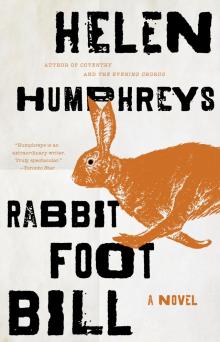 Rabbit Foot Bill
Rabbit Foot Bill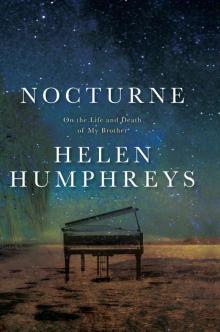 Nocturne
Nocturne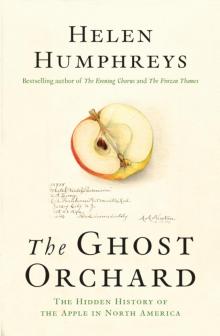 The Ghost Orchard
The Ghost Orchard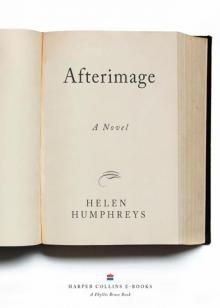 Afterimage
Afterimage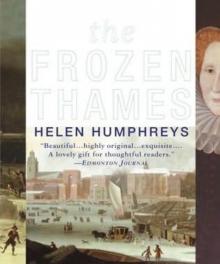 The Frozen Thames
The Frozen Thames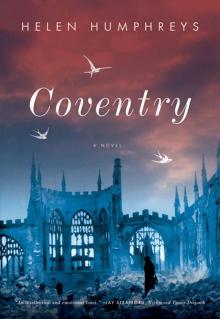 Coventry: A Novel
Coventry: A Novel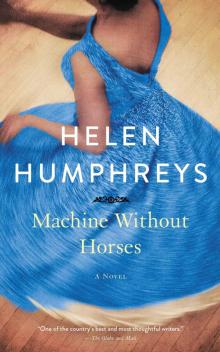 Machine Without Horses
Machine Without Horses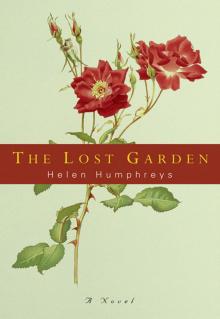 The Lost Garden: A Novel
The Lost Garden: A Novel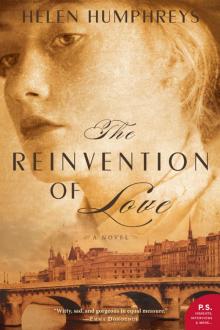 The Reinvention of Love
The Reinvention of Love Helen Humphreys Three-Book Bundle
Helen Humphreys Three-Book Bundle